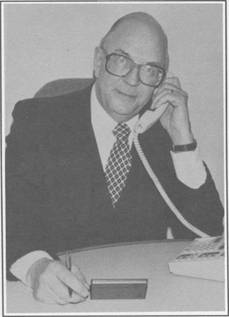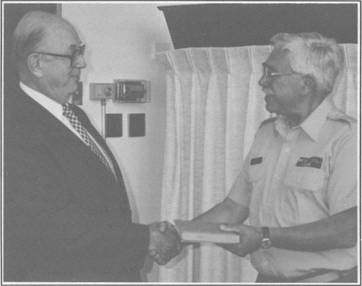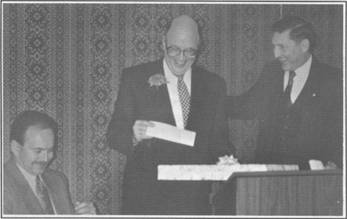
|
|||
|
GORDON POLE A Passionate Character by Cheryl Lowe
What do a passion for historical research, a fascination with inventors, and an aquarium with no fish have in common? They belong to Gordon Pole, Manager of GTA for Nova Scotia.
Pole has been with GTA for 16 years, following a career in data communications with the New Brunswick Telephone Company. For he and his family, Halifax was the 33rd move! Bom in Toronto, Pole delivered telegrams as a boy, and later studied industrial engineering at Ryerson. He has always had an intense interest in communications technology.
Atlantic Region staff will recognize Pole as the author of "Dreamers and Doers" - a series of feature articles he writes for their newsletter, Atlantic InterComm.
Pole has a knack for presenting characters from history in an anecdotal way. They become much more than just names and facts from the past. Men like Marconi, Gisbome, Fessenden, Bell and Henry have taken on threedimensional personalities through his writing, and we are exposed to their lives and times as if peering through a keyhole into the past.
"The inventors had a common thread that tied them together," says Pole, "We only observe phenomena and take it for granted ... these people asked why!" His eyes light up when he talks about a definitive book on communications, dated 1885, which has discussions between such men as Alexander Graham Bell and Joseph Henry. "Do you know what Edison said when he was asked why he never got tired of trying things over and over?" asks Pole. "Because now I know 10,000 things that don't work!" he quotes.
Pole has a special project for the future - a book for which he has already written the outline. He began the historical research in 1974. The main character, Obediah, has worked for each of the inventors in his book. "Obe's adventures take him to Williams machine shop in Boston where the early inventors worked," says Pole. "You know, they were all kind of strange ...Edison's sleeplessness is famous, and Bell didn't like moonlight..." He talks about these men as if they were personal acquaintances.
"If I had to do it again, I might not have moved around so much," says Pole, "but otherwise I wouldn't change a lot. There has to be something more though," he says. "I want to give something back, to leave my mark." Perhaps that m ark is to be alive through Obediah.
And the empty aquarium bubbling away in his office? "As soon as I put fish in it, I'll be transferred," says Pole with a smile. "That just always happens!"
Rare Book for the Bell Archives by Megan Williams
In early September 1992, Jack Stevens, Superintendent of the AlexanderGraham Bell Historic Site, accepted a copy of a rare book entitled Pioneering the Telephone in Canada for the Bell Archives. Maritime Telephone and Telegraph purchased the volume, which was presented by Gordon Pole of the Government Telecommunications Agency on behalf of GTA and Communications Canada.
Gordon, who has a scholarly interest in the history of the telephone, discovered this book in a used book store in Halifax and recognized its archival significance for the Bell collection. Pioneering the Telephone in Canada is a collection of the reminiscences of A. Melville Bell, father of Alexander Graham Bell, who was given the Canadian rights to market the invention. It was privately published in 1926. This particular volume is of special interest because of its provenance. The inscription of the flyleaf, dated August 11, 1937, indicates that it was presented to Bell's associate, Casey Baldwin, by Ludlow Haskell, then assistant vice-president of Bell Canada, to commemorate his visit to Beinn Breagh.
In his notes for the presentation, Gordon says: "While this book is not a technical discussion of the telephone system the first-person account gives us some insight into its development in Canada and a better understanding of the difficulties that were encountered. It is worth noting that the Canadian telephone system developed as a regulated monopoly, sheltered from market-driven forces. As a result, we now have a reliable telephone system in Canada that is second to none in the world."
When asked about the country of origin of the telephone, Bell's diplomatic answer was that "it was conceived in Canada and born in Boston." Bell's association with Canada did not end with that significant conception; he returned to Baddeck to spend much of the rest of his life at his estate, Beinn Breagh, across the bay from the present location of the Alexander Graham Bell National Historic Site. While at the "Beautiful Mountain", his experimentation took such diverse forms as salt water distillation, the design and building of hydrofoils and the famous flight of the Silver Dart. These experiments were carefully documented in a series of journals which form the core of the archival collection at the Historic Site.
Bell would be intrigued to know that the current custodians of his work are designing a way of making the archives available through the use of laser discs. When the project is completed, scholars and researchers will have access to such information as the contents of Bell's journals and a catalogue of the entire collection, including an entry for a small volume entitled Pioneering the Telephone in Canada. There is no end to the evolution of human communication.
A Gentleman Retires
A retirement dinner in honour of Gordon Pole was held in Halifax on October 5, 1992. During the evening, Gordon was recognized by his colleagues at DOC, the vice-president of MT&T and representatives of local telecommunications organizations. Also on hand were Joan, Gordon's wife, two of their children and spouses.
The Staff Benefit Fund presented Gordon with a framed photograph of the Cabot Trail while René Guerrette presented the guest of honour with a gift on behalf of DOC employees in the Atlantic region. Pierre Boudreau, Executive Director, also presented Gordon with a certificate from the Prime Minister.
Despite a lot of good-natured ribbing that went on, one word kept popping up. That word was "gentleman". Whether it be at work or in a social environment, that is what Gordon was and is.
|
|||
|
|||









